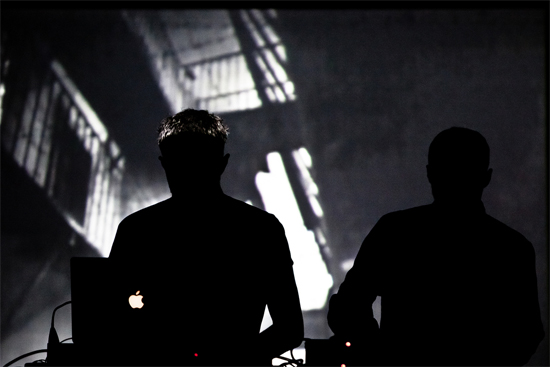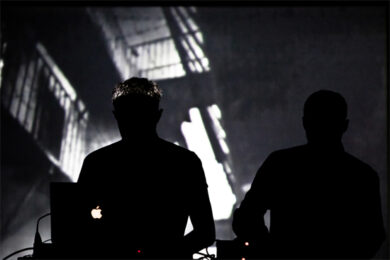In his pivotal essay Music as a Gradual Process, the composer Steve Reich noted the following with regard to process music (which predated minimalism by a couple of decades, though is so closely intertwined with it that the two terms are often used interchangeably): "I begin to perceive these minute details when I can sustain close attention and a gradual process invites my sustained attention. By ‘gradual’ I mean extremely gradual; a process happening so slowly and gradually that listening to it resembles watching a minute hand on a watch – you can perceive it moving after you stay with it a little while."
Listening to Raime’s music, whether the debut Raime EP, Hennail or, most recently, their debut full-length Quarter Turns Over A Living Line, you suspect that Joe Andrews and Tom Halstead regard those reflections as doctrine. The latter in particular is an epic study in vast, cavernous resonance and the sort of bass that engulfs you whole, as indebted to dub and doom metal as it is to classical minimalism. Despite its inclusion of acoustic instrumentation into the duo’s electronic blueprint, there’s still sonically very little going on, so that what is present lends itself to extremely focused listening. You notice every tiny element, the slightest shift in timbre or fragment of distortion. Tracks like ‘Soil & Colts’ and ‘Passed Over Trail’ are so funereally slow that they feel like music stripped back to its barest bones: dry, resonant drums, wailing drones and massive, awesome bass, set within acres of profoundly empty space.
Raime bring a similarly elemental minimalism to their live audiovisual show, its beauty more architectural or sculptural than simply musical. Quarter Turns Over A Living Line‘s dystopian godlessness lends itself well to being played out in LSO St. Luke’s, a deconsecrated church. As with the drone music of support act Mohammad, it sharpens your concentration intensely. But where the latter band use instrumentation to stack up multi-textured drones, Halstead and Andrews do just the opposite, using a bare minimum of gear to orchestrate their massive process of subtractive music, which sounds as if it’s being disinterred from the crypts beneath us. Halstead and Andrews are barely visible in the shadow beneath the screen, dressed in black and shrouded in darkness, and though they may not be doing much onstage, such is the perfectionism of the record that there’s little need for much more than playing it at high volume.
Just as the music’s torturously slow pace focuses your attention on its most minute details, so it is with its accompanying visual focal point. Produced by Dakus Films, Raime’s visualisations [which you can watch a clip of here] recall the album in so far as they contain no discernible narrative, though a number of repeated motifs point to an amorphous theme of cyclical birth and death. A naked sinewy man blooms from a casket-like enclosure amid a floating mass of dust. Is it an exhumation, or the footage of burial played in reverse? We’re given only signifiers, points between which to draw our own fictive lines. The man’s painful, glacial slowness highlights every bodily and facial nuance, things that would otherwise flicker by but here are magnified into grotesqueness, each wrinkle in his contorted face equivalent to a whole new, impenetrable expression. Throughout the performance, he moves through industrial landscapes at a laborious pace, his interaction with dust, fire and water a visual analogue to the music’s elemental quality.
The man pours water on himself, the slow cascade of each droplet visible and protracted as the deep drones. Later, he circles ominously, black coat billowing as he turns an inverted table around in a bleak urban wasteland. Just as the journey of those droplets or the plumes of dust that rise gradually from his feet are rendered fully visible through their slowness, so is the process of the music, from the field recordings of strange industrial percussion to mangled ghosts of voices. At this speed, both musically and visually, everything is abstracted, spacious and heavy with unexplained meaning. As terse strings and excoriating bass drones open ‘The Walker In Blast And Bottle’, a flame emerges on screen. Held in an archway, it’s the brightest thing in the whole church, throwing into relief the contrast between bright screen and the surrounding dimness. The fire spreads with horrifying slowness so that each feathery lick of flame is exhaustively detailed. It fills the visual field, before it dies and the screen lapses into darkness.
By virtue of sonic absence, Raime’s minimalist music endows its few essentials with both complex detail and brutal potency, obviously laboured and perfected with insomniac rigour. Perhaps that explains why tracks like ‘The Dimming Of Road And Lights’ feel intuitive, as if Raime communicate in the universal language of birth and death. The incessant, morbid pound of the kickdrum is like a jackboot lodged in your chestplate.
This is massive and cathartic and portentous music, and while there may be a couple of chinks of light here and there – at one point there’s something similar to phosphorescence onscreen that’s almost pretty – its beauty is in its black heart. The universality of its themes notwithstanding, this is a supremely isolating experience, the darkness and dead air between the notes loaded with loneliness. Between the performance’s end and the applause, a pause as weighty as the music that preceded it fills the room, as if to underline that although the last hour or so has been dominated by crushing volume, its potency is derived from the pregnant space that surrounds it. For a moment, the silence throws a light on everything that’s preceded it, and then it too fades to black.



